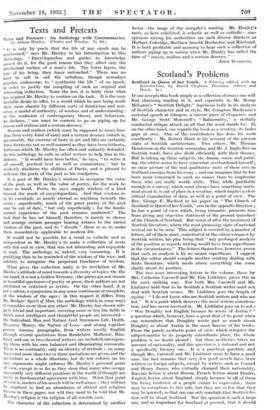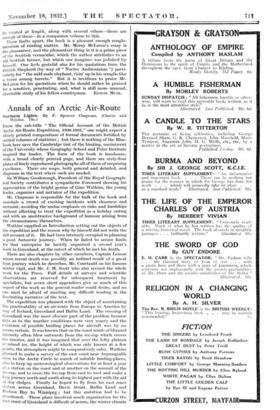Scotland's Problems
Jr one accepts this book simply as a collection of essays one will find charming reading in it, and especially in Mr. Moray MeLaren's "Scottish Delight," ingenious both in its analysis of Scottish character and in style, Mr. Compton Mackenzie's rectorial speech at Glasgow, a sincere piece of eloquence, and Mr. George Scott Moncrieff's " Balmorality," a skilfully conducted oblique attack on all that the word stands for. It', on the other hand, one regards the book as a scrutiny, its faults gape at once. One of the contributors has done his work excellently : Mr. Robert Hurd in his account of the present state of Scottish architecture. Two others, Mr. Thomas Henderson on the Scottish vernacular, and Mr. J. Inglis Ker on Scottish roads, have also dealt efficiently with their themes. But in taking up three subjects, the drama, music and paint- ing, the editor seems to have somewhat overburdened himself ; no clear picture of the real qualitative state of these arts in Scotland emerges from his essay ; and one imagines that lie has been more concerned to omit no names than to emphasize those who are really worth while. This, while justifiable enough in a survey, Which must always have something statis- tical about it, is out of place in a scrutiny, which implies a close critical examination of data, as well as a point of view. The Rev. George F. Macleod in his paper on "The Church of Scotland in Quest of her Youth," errs in the opposite direction ;1 he has a point of view which, being romantic, prevents him ' from giving any objective statement of the present quandary of the Church of Scotland. But worst of all is the treatment of Scottish literature, where the most promising signs of national revival are to be seen. This subject is covered by a number of letters, all of them short, contributed at the editor's request by Scottish writers, his plea being that "any prolonged analysis of the position as regards writing would have been superfluous in the circumstances." The letters themselves, however, prove that such an analysis is by no means superfluous. I suggest that the editor should compile another scrutiny dealing with Scots literature, which needs above everything else some clarity about its position.
The two most interesting letters in the volume, those by Mrs. Catherine Carswell and Mr. Eric Linklater, prove this in the most striking way. For both Mrs. Carswell and Mr. Linklater hold that to be Scottish a Scottish writer need not deal with Scottish scenes. Mr. Linklater goes the length of saying : "I do not know who are Scottish writers and who are not." It is a point which deserves the most serious considera- tion, and has never received it. Mr. Linklater goes on to ask : "Was Doughty not English because he wrote of Arabia ? " a question which, however, loses a great deal of its point when one remembers that Doughty wrote just as much about Doughty as about Arabia in the most famous of his books. From the purely aesthetic point of view, which relegates the subject-matter to its properly subordinate place, the whole problem is no doubt absurd ; but then aesthetics takes no account of nationality, and this question is a national and not a specifically literary one. It is a practical question, and though Mrs. Carswell and Mr. Linklater seem to have a good case, the fact remains that very few good novels have been written on foreign subjects, except by writers such as Conrad and Henry James, who virtually changed their nationality. Russian fiction is about Russia, French fiction about France, English fiction about England, simply because in all of them the living tradition of a people comes to expression ; there may be exceptions to this rule, but they are so few that they may be ignored; so that one can only conclude that Scottish fic- tion will be about Scotland. But the question is such a large one, and so important for Scotland at present, that it should
be treated at length, along with several others—there are enough of them—in a companion volume to this.
These faults apart, the book is a pleasant enough conglo- meration of reading matter. Mr. Moray McLaren's essay is the pleasantest, and the pleasantest thing in it is a prime piece of the Scottish vernacular, which the author attributes to an old Scottish farmer, but which one imagines was polished by himself. One feels grateful also for his quotations from the Ettrick Shepherd (by way of " Noctes Ambrosianae ") parti- cularly for" the auld male elephant, risin' up in his seraglio like a tower aiming turrets." But it is invidious to praise Mr. McLaren for his quotations when he should rather be praised for a sensitive, penetrating, and, what is still more unusual, charitable study of his fellow-countrymen. EDWIN Mum.

































































 Previous page
Previous page